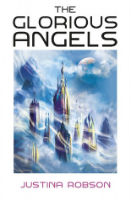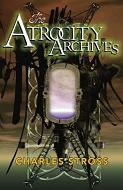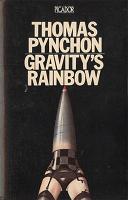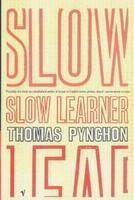 Justina Robson is a British writer of Science Fiction like the magnificent Natural History, and of the less easily categorisable but hugely entertaining Quantum Gravity series (multi-dimensional urban magic police procedural - ?). Fantastic Fiction lists 10 novels and a collection of short stories under her name – this includes the book at hand, The Glorious Angels, where she attempts to walk the narrow line between SF and Fantasy.
Justina Robson is a British writer of Science Fiction like the magnificent Natural History, and of the less easily categorisable but hugely entertaining Quantum Gravity series (multi-dimensional urban magic police procedural - ?). Fantastic Fiction lists 10 novels and a collection of short stories under her name – this includes the book at hand, The Glorious Angels, where she attempts to walk the narrow line between SF and Fantasy.
The story plays in the city of Glimshard – a former Sircene Mage City, but now part of the Golden Empire; ruled by an Empress (each of the 8 cities has one, they are mentally linked). Glimshard is at war, due to an expedition into the Southern Fragment, for what is called an 'Excavation'. The army is over-stretched, and the losses are huge and unsustainable. And the dig is in the Karoo forest – the Karoo being one of the decidedly non-human species on this world (although there is a huge amount of snobbery on what is considered human and what not - they definitely are not), and apparently a formidable enemy. I was not sure, for most of the book, what the reason for this was – why this was so important, worth that war, worth risking everything including the Empire. Are they really that desperate? Or that jaded? Or is this only the Empress' doing?
But now a Karoo from the North has arrived, and joined the ranks of the mercenaries propping up the army and the war effort, and things are spinning quickly out of control. There is conflict between the Empresses, someone is plotting against Torada (Glimshard's Empress), the Infomancers are spying on everyone, and Aline, the Minister of Defense, is blackmailing Tralane, a crystallomancer and Matriarch of one of the old Sircene mage families for materials for his (forbidden?) magic weapon projects...
This is a fascinating society, with loads of layers, structures, and history. It is a Matriarchy, with the Empress on top; with Old Houses, mage lines, and loads of old, lost, forgotten knowledge, skills, and technology. The rituals, gender relationships, and sexual politics are complex and intricately structured. Magic here is an old technology, which is magic. There are Crystallomancers, Blood Mages, but also structures, research, manuals, and blueprints for technology powered and enabeled by electricity as well as different types of magic. Lots of knowledge, technology, and power is now arcane, and thus proper/indistinguishable from magic. Essentially this is a society at the tail-end of a high culture running on magical technology, although notentirely in a A C Clarke sense. There is programming, mixed with electronics, which makes up magic; but not in a Strossian sense, either, sadly.
You might have gathered that Robson here is attempting to walk the line between Science Fiction and Fantasy. She does not pull this off (as much as most people fail at that trick), and comes down on the side of the latter – I would have found this easier to accept if the story and setting would deliver more on its promise; as it stands my feeling was that she couldn't really decide what kind of story she actually wanted to write, and the story ran off into the left-field. But that's conjecture, of course.
The book, surprisingly really, occasionally left me with a feeling like Beckett's Dark Eden – and if you know my relationship with that story then you know that that's not a Good Thing, not really praise.
Nevertheless, The Glorious Angels has the skeleton, the structure of something deep, deeply layered, rich, and fascinating. The fact that it does not fully deliver on that promise is a crying shame, in my opinion. There are so many interesting concepts, ideas, strands; and a good number of them not really developed to their potential, or followed through on (and there is so much I would have wanted to see, experience, learn!) - for a while I thought I was reading the first instalment in a series, but I cannot find any indication that this is indeed the case.
The characters are engaging in most parts, but they are changing a lot, sometimes very quickly, and sometimes without a perceptible reason. The same happens with with the viewpoint – there are substantial shifts in focus and scope, and not all of them are exactly satisfactory.
It’s amazing how things which look large, huge, important, immovable in some part of the story become irrelevant, negligible in the developing story with its shifts in focus and scope. These shifts are generally well handled and executed, but can leave you disoriented as the entire setting moves with them.
Sometimes the first half of the book felt like a rather endless account of social encounters, exposition from diaries, sexual encounters, politicking and scheming, domestic encounters etc; and not all of it entirely engrossing for me. This included also way too much sex, and sexual politics for my taste. Yes, there’s a reason for some of that in the story, in the set-up (and it does not get resolved, either), but still. Meh.
Around the Halfway point it felt like we were getting a more SFnal spin, but this remained superficial, bolted on (and substantially wrong physically in at least one case. Yes, I know, this is not hard SF, but it still bothers me when SF writers get basics wrong).
I think the most impressive, vivid, engaging scenes in the book are events of domestic distress cocerning Tralane and her teenage daughters. Of course any speculation regarding if this is co-incidence, or invested heart blood from a maternal perspective are irrelevant to the story and to this review, too, but I was intrigued nevertheless.
Also, on a more general note, I was wondering what motivates writers to write such a Matriarchy, ie a conscious choice of a governing structure/rule which discriminates by gender, and which would be illegal in the here and now. Reversing this to a Patriarchy where females are treated as sexual playthings, disbarred from central/important jobs and functions, and know (and accept) their station in life takes us deep into Sad Puppies territory; and it is just as wrong in my opinion.
Overall there are too many dead ends, too many areas tantalisingly foreshadowed and not delivered upon here. I found the book, overall, to be unbalanced, in terms of pacing and focus, and in terms of development and the overall story arc. Not Justina's best effort in my books; although everyone is free to disagree...
Title: The Glorious Angels
Author: Justina Robson
Reviewer: Markus
Reviewer URL: http://thierstein.net
Publisher: Gollancz/Orion
Publisher URL: http://www.orionbooks.co.uk
Publication Date: March 2015
Review Date: 150404
Pages: 464
Format: ePub
Topic: Fantasy
Topic: Seeding
Thanks to the publisher for the review copy.














